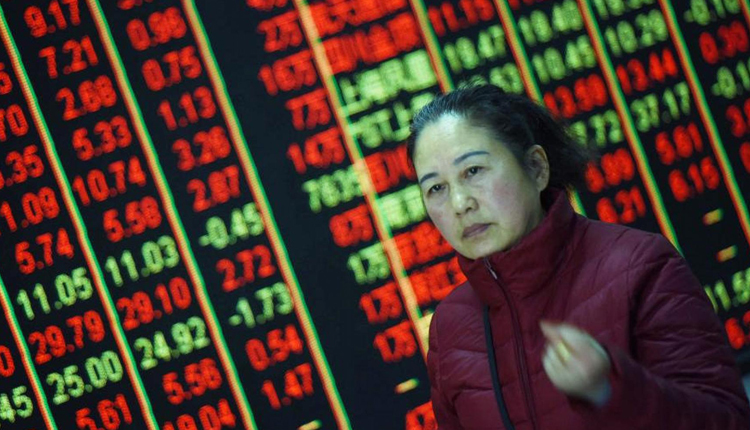Shares in Asia saw their losses deepen as the Thursday session progressed, with investors cautious ahead of a deadline when tariffs from the U.S. and China are due to be implemented.
On the mainland, losses on the Shanghai composite steepened through the morning, with the index trading down 0.88 percent by the midday break. The smaller Shenzhen composite declined 1.12 percent.
Hong Kong’s Hang Seng Index lost 0.88 percent, with the energy and materials sectors among the worst-performing. Heavily weighted financials stocks eased 1.12 percent.
Japan’s Nikkei 225, meanwhile, dropped 0.98 percent amid broad-based weakness, with declines in oil producers and retailers leading losses the losses. Index heavyweight Fast Retailing slumped 2.67 percent.
Elsewhere, South Korea’s Kospi reversed early gains to track lower by 0.78 percent as blue-chip tech names dipped into negative territory, with Samsung Electronics trading down 1.08 percent. Australia’s S&P/ASX 200 bucked the trend to advance 0.47 percent.
MSCI’s index of shares in Asia Pacific excluding Japan came under pressure, trading lower by 0.4 percent during Asia afternoon trade.
Concerns over a trade dispute between the U.S. and China have weighed on market sentiment in the lead-up to tariffs both countries say will take effect on July 6. The Trump administration has levied a 25 percent tariff on $34 billion in Chinese goods, while the Chinese government has retaliated by announcing tariffs on the same value of U.S. goods.
Due to the time difference, duties imposed by Beijing would likely take effect before Washington’s tariffs on Friday. China’s finance ministry, however, has said that it “absolutely will not fire the first shot” in its trade spat with the U.S., Reuters reported.
“Uncertainty over the tariffs’ impact on trade [has] led to a subdued mood in risk assets,” Weiliang Chang, a foreign exchange strategist at Mizuho Bank, said in a note.
Although the economic impact of the first wave of tariffs is relatively small, investors have been nervous over potential retaliation, which could cause the spat to evolve into a trade war. China markets have taken a hit ahead of the Friday deadline, with the benchmark Shanghai composite last week falling into bear market territory, referring to a drop of at least 20 percent from recent highs.
“Markets are not pricing in just the first tranche, but increased risks of an escalation to broad-based tariffs across the entire merchandise goods space. The fear is that Trump has threatened to retaliate against China’s retaliatory tariffs, and it could be more than a bluff to coerce,” Chang added.
While recent sharp declines in the Chinese markets have been attributed to trade tensions, those fears had been preceded by concerns over a China slowdown, Johanna Chua, head of EM Asia economics and strategy at Citi Global Markets Asia, told CNBC’s “Squawk Box.”
“I think emerging markets at the moment, including China, are all still relatively vulnerable because I think the divergence story about growth trajectories, including the U.S. looking better than the rest of EM (emerging markets), is story that’s going to linger. I don’t think the China slowdown growth momentum has really bottomed yet,” Chua said.
The declines in Asia come on the back of European stocks closing mixed in the last session. The pan-European Stoxx 600 edged up by 0.04 percent by the end of the day, but the U.K.’s FTSE 100 and Germany’s DAX both recorded moderate declines.
Markets stateside were closed on Wednesday because of the Independence Day holiday.
In corporate news, the HNA Group Chairman Wang Jian passed away in an accident while on a business trip in France, the company said. Wang had a 15 percent stake in the group, formerly one of China’s most acquisitive companies, according to Reuters.
In currencies, the yuan pared some overnight gains after notching an 11-month low against the dollar earlier this week. The stabilization in the currency came after the People’s Bank of China reassured markets about the currency.
The on-shore yuan traded at 6.6372 to the dollar at 11:54 a.m. HK/SIN, compared to Wednesday’s close of 6.6330.
The dollar index, which measures the dollar against a basket of currencies, last stood at 94.516. Against the yen, the dollar traded at 110.34 at 11:54 a.m. HK/SIN, below levels around the 110.8 handle seen at beginning of the week.
Source: CNBC
